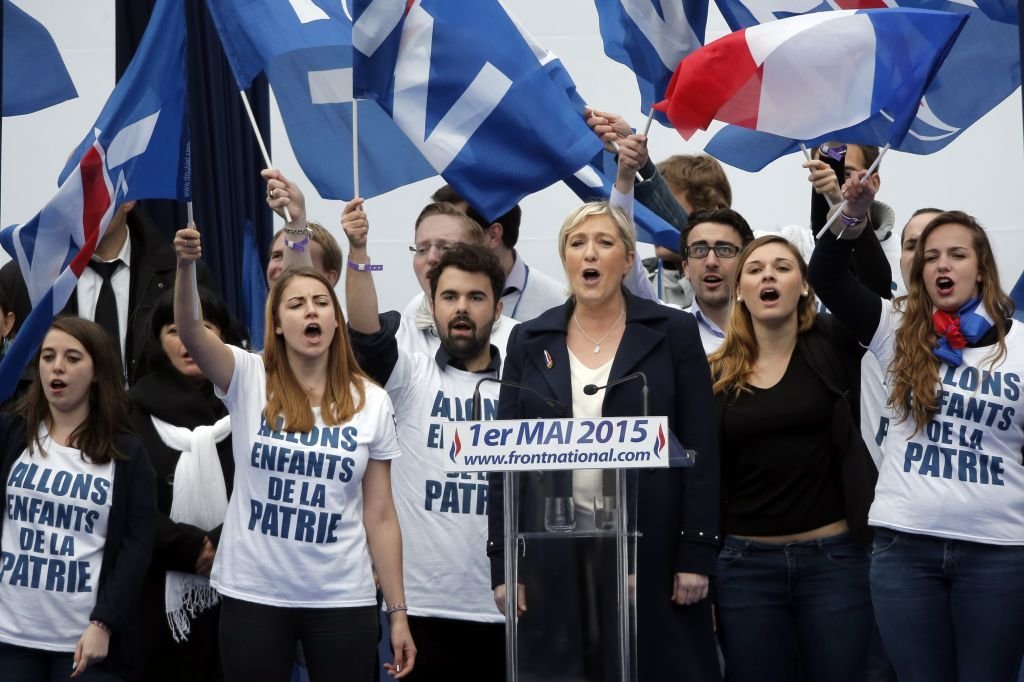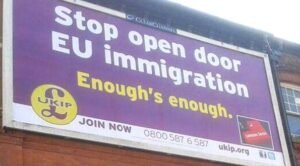Immigration Skeptic: Right-Wing political parties across Europe

Sunday was a landmark day for French politics. As the country comes to terms with the devastating attacks in Paris last month, a right-wing political party made history in the first round of regional elections. The ‘Front national’ political party, led by 47 year old Marine Le Pen, came first in 6 out of 13 French regions. While national elections do not take place in France until 2017, the growing popularity of the ‘Front national’ has raised many eyebrows. The party’s right-wing stance, particularly their anti-immigration and anti-Muslim rhetoric, has resulted in many fearing that racism and xenophobia may creep into French society.
The Front national’s recent success is part of a similar trend across Europe, with right-wing political parties gaining ground in even the most liberal countries. While policies can vary, the political groups share the belief of either a controlled immigration policy, or an anti-immigration policy. Many of the groups are also strongly opposed to their respective country’s EU membership. Finally, the political leaders of these groups also tend to scapegoat Muslims, perceiving them as a threat to European values.
We have briefly profiled 8 right-wing political parties across the European continent. Some of them can be labelled the ‘moderate-right’; others can indeed be seen as the ‘extreme-right’. While some of these groups popularity has increased in recent years, others have seen their ratings decline.
Jobbik (Hungary)
While Hungarian prime minister Viktor Orban’s political views can lean towards the right, it is the political party ‘Jobbik’ who have gained notoriety as Hungary’s most radical right-wing group. Receiving 20% of the vote in Hungary’s 2014 elections, the ‘Jobbik’ party have become infamous for their anti-Roma and anti-Semitic rhetoric. Jobbik’s leader, Gabor Vona, has previously described the party as ‘radical’.
Golden Dawn (Greece)

Arguably one of the most extreme right-wing groups in Europe, Golden Dawn emerged in Greece in the late 1980’s and early 1990’s. The economic recession of the late 2000’s led to great dissatisfaction among the Greek population, with Golden dawn marketing themselves as an anti-austerity and anti-EU political party. An explicit anti-immigration stance lead to the group developing a racist and xenophobic reputation. This came to the forefront earlier this year, when some of their members were put on trial, accused of attacking immigrants and opponents. While not as popular as a few years ago, the group still managed to gain 7% in the September 2015 Greek elections.
Dutch PVV (The Netherlands)
The Dutch PVV, also known as The Party for Freedom, was founded in 2005. The party got off to a slow but surprising start in the 2006 Dutch elections, getting 7 out of 150 seats in parliament. In 2010, the party received a total of 24 seats in the Dutch parliament. 2012 saw the party’s popularity decline, with them receiving only 15 seats in parliament. The party’s leader, Geert Wilders, is seen as a radical by many. His most infamous moment to date was when he told supporters that he would ensure there were “fewer Moroccans” in the country.
Lega Nord (Italy)

Italy’s Lega Nord’s growing popularity became evident in 2015, due to success in regional elections. The party’s leader, Matteo Salvini, has been described as ‘virulently anti-immigrant’. He has also gained attention for his criticism of Pope Francis’ attempts to promote dialogue with Muslims.
Danish People’s Party (Denmark)
The Danish political landscape fundamentally changed in 2015, with the right-wing ‘Danish People’s Party’ receiving more than 21% of votes in the general elections. The party believes in controlling migration through strict border control. The leader of the party is Kristian Thulesen Dahl, who has developed a reputation as not being too outspoken. This is in contrast to former leader Pia Kjaersgaard, who once described Muslims as people who “lie and deceive, cheat and swindle”.
Freedom Party of Austria (Austria)

Austria’s far-right Freedom Party gained 31% of the votes in the 2015 Vienna city election. Leader of the party, Heinz-Christian Strache, has publicly expressed Islamic-skepticism. Responding to the refugee crisis, he called for the need to let Christian and Jewish refugees into Austria, rather than Muslims. To quote Strache: “We don’t want an Islamisation of Europe. We don’t want out Christian-Western culture to perish”.
Law and Justice (Poland)
Law and Justice is currently the largest party in the Polish parliament, winning 242 out of 460 seats earlier this year. The party’s leader, Jaroslaw Kaczynski, attracted negative attention this year by stating that “refugees from the middle-East could bring diseases and Parasites to Poland”.
UKIP (United Kingdom)

While perhaps not as extreme as The British National Party, UKIP are very critical of Britain’s current immigration system. The party’s leader, Nigel Farage, has previously called for HIV positive migrants to be kept out of Britain. UKIP received 12% of the vote in Britain’s general elections this year, which was a significant increase in votes from the general elections in 2010.
Identity Ireland (Ireland)
Identity Ireland is a new-right wing political party which formed in Ireland during the summer of 2015, The party is against mass immigration, and is also very critical of multiculturalism. The party’s official website explicitly states one of their policies as being a ‘zero tolerance approach towards demands to alter national life, culture and traditions, to accommodate minority held beliefs and cultures’. Whether the party will have any success in future elections remains to be seen.